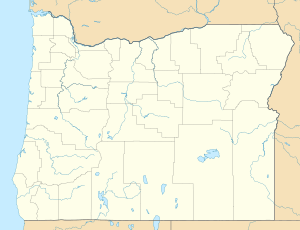Willow Creek (Deschutes River tributary) facts for kids
Quick facts for kids Willow Creek |
|
|---|---|
|
Location of the mouth of Willow Creek in Oregon
|
|
| Country | United States |
| State | Oregon |
| Counties | Crook, Jefferson |
| Physical characteristics | |
| Main source | Ochoco Mountains Ochoco National Forest, Crook County 4,415 ft (1,346 m) 44°30′28″N 120°48′29″W / 44.50778°N 120.80806°W |
| River mouth | Deschutes River Lake Simtustus, Jefferson County 1,591 ft (485 m) 44°40′18″N 121°13′41″W / 44.67167°N 121.22806°W |
| Length | 26 mi (42 km) |
| Basin features | |
| Basin size | 181 sq mi (470 km2) |
Willow Creek is a cool stream in central Oregon, United States. It is about 26 miles (42 kilometers) long. This creek flows into the Deschutes River, which is a much bigger river.
Contents
Exploring Willow Creek
Willow Creek starts high up in the Ochoco Mountains. This area is in Crook County. The creek then flows mostly northwest. It passes through a special area called the Crooked River National Grassland. This grassland is a wide-open space with lots of plants and animals.
Where Does it Flow?
As Willow Creek continues, it goes through the city of Madras. After Madras, the creek becomes a natural border. It divides two flat areas of land. These areas are called Agency Plains and Little Agency Plains.
Finally, Willow Creek flows into the Deschutes River. It joins the river above Pelton Dam. This dam creates a lake called Lake Simtustus. The spot where Willow Creek meets the Deschutes River is about 105 miles (169 kilometers) from where the Deschutes River joins the Columbia River.
Other Streams Joining Willow Creek
Many smaller streams flow into Willow Creek. These are called tributaries. They add more water to the creek. The main tributaries, starting from where Willow Creek begins, are:
- Higgins Creek
- Coon Creek
- Newbill Creek
- McMeen Creek
- Dry Canyon
Animals in Willow Creek
Willow Creek and its smaller streams are home to different kinds of fish. These fish live and grow in the cool, clear water. Some of the fish you might find there include:
- Redband trout: A type of trout known for its reddish stripe.
- Largescale sucker: A fish with large scales that feeds on the bottom.
- Bridgelip sucker: Another type of sucker fish, named for its unique mouth.
- Longnose dace: A small fish with a long snout.
These fish are an important part of the creek's ecosystem. They help keep the creek healthy.
 | Calvin Brent |
 | Walter T. Bailey |
 | Martha Cassell Thompson |
 | Alberta Jeannette Cassell |


